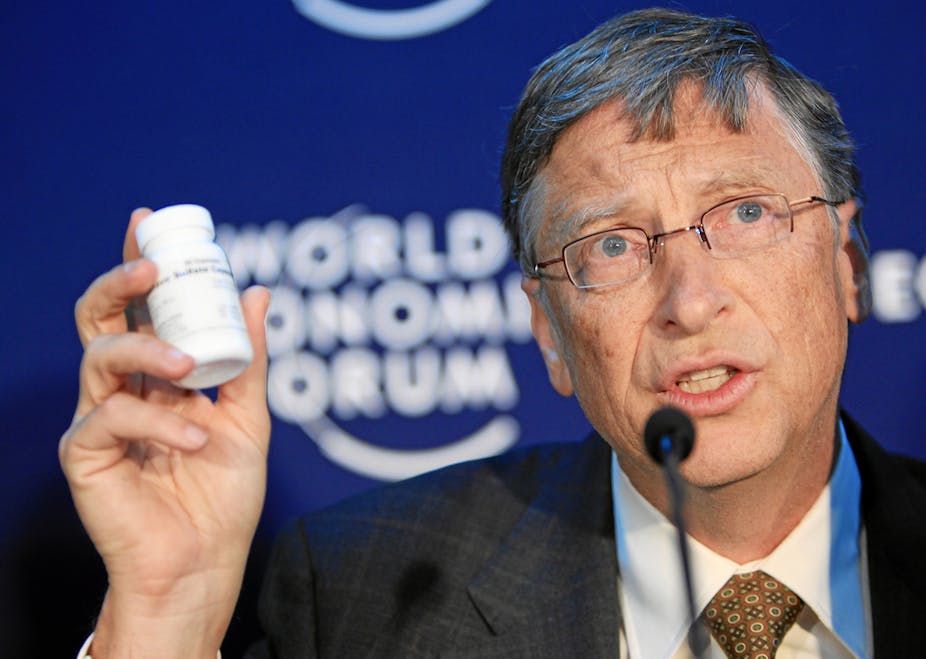The World Economic Forum’s (WEF) annual gathering in picturesque Davos is always full of highest-level gossip, bellwether pronouncements, and – sometimes – significant insights. And from the global health point of view, the most important sessions are actually those on the state of the global economy, not those labeled health.
This is because the robustness of governments’ finances determine what money is available for domestic programs and foreign aid. In fact, economic vibrancy is crucial for people earning sufficient incomes that they can invest in their own health, where governments are lacking. But the next most important health announcement at the latest meeting, which ended on Sunday, was one with a frisson of scandal.
The good news side of the story was Bill and Melinda Gates committing another $750m over five years to support the Global Fund to Fight AIDS, Tuberculosis (TB) and Malaria. The corridor talk, however, focused on the announcement that the head of the Global Fund, Frenchman Michel Kazatchkine, was resigning and that a general manager was stepping in to sort out the managerial quagmire at the Fund.
The Fund’s inner non-workings had been highlighted in a review following documented misappropriation of Fund grants in the order of $34 million. In fact, $34 million is less than 0.3% of the billions the Fund has dispensed. But the scandal provided a number of governments a convenient pretext to suspend or withdraw their support in times of austerity.
Of course, donor governments must be prudent stewards of taxpayer money. But picking on the Fund’s unusually proactive investigation and disclosure while most bilateral donors and other multilaterals lack anything like this degree of transparency appeared rather hypocritical.
In some ways there’s equal hypocrisy in the statements made by officials decrying Dr Kazatchkine’s management abilities. Dr Kazatchkine was appointed in 2007 at the apex of a distinguished medical career, including significant technical contributions to the early days of the Global Fund. He’s intelligent, articulate in several languages, and an urbane and compelling advocate. But perhaps his most crucial trait in securing the post to lead the Fund was that he’s French.
While the Fund advertised the post widely with independent headhunters, there were significant behind-the-scenes political machinations at work. The French were keen to champion their innovative financing mechanism to support the Global Fund, UNITAID. At the same time, the United Kingdom was promoting its adopted brainchild, the Advance Market Commitment, to deliver billions to the GAVI Alliance for new vaccines. Both needed the other to succeed.
Let’s be clear, it was great for global health to have so many highly-engaged political advocates bringing new moneys to bear and willing to trial new approaches. And millions for people have been treated for HIV, TB, malaria and vaccine-preventable diseases as a result – people who otherwise would have continued to be neglected.
Nevertheless, there is a real complexity in the political horse-trading that affects even these new models, which are essentially public-private partnerships. They must keep their (predominantly public) donors happy in order to keep funds flowing. And, at the same time, these donors sit on the organisations’ boards where they may choose to prosecute national interests over those of the organisations and the people they serve.
Both the Global Fund and GAVI have conflict of interest policies. In both cases, they are insufficiently comprehensive. The same can be said for the World Health Organisation’s (WHO) ongoing governance review. All focus on the risk of the corrupting influence of corporate and private interests without mitigating undue public pressures and sway.
From the WHO we can point to clear examples of how countries, such as Japan, that are also significant producers and profiteers of tobacco, have shaped global tobacco policy. It’s usually harder to track the conflicts that may take place within other multilateral boards.
These organisations need to update their approaches to conflict of interest, specifically to counter the risks of representational boards.
Bill Gates sent an important message of support for the Global Fund, as he had earlier in 2011 for GAVI. Now he needs to help the Fund’s new leader, Mr Gabrielle Jaramillo – a highly experienced banker with expertise in corporate turn-arounds – to reform not only the operations of the Fund, but also the skills and practices of the Fund’s Board. Both need to encourage a more modern, multi-sector transparency in the governance of the public-private partnerships. Because clearly, there’s little incentive for the governments to do it for themselves.

